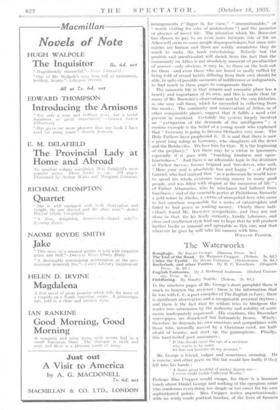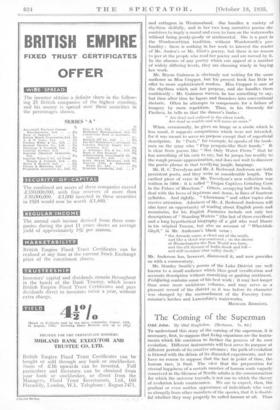The Waterworks
Roughage. By Daniol George. (Samson Press. 3s.) Fieldfaring. . By Stanley Snaith. (Nelson. t 2s. 6d.) Ix the nineteen pages of Mr. George's short pamphlet there is much to hearten the reviewer.: there is the information that he was with C. C. a part-compiler of The English in Love; there is significant observation and a recognisable personal rhythm ; and there is the fact that he seldom tries to bludgeon the reader into submission by the authority and nobility of senti- ments inadequately expressed. His emotions, like December water-pipes, are disordered but fortunately frozen. Wisely, therefore, lie distrusts his own emotions and sympathises with those who, inwardly moved by a Christmas carol, are half- afraid of beauty, and start up the gramophone. Finally, this hard-boiled poet announces :
" If this Should meet the eyo of a reviewer who wants to be nasty lot him not hesitate on my account."
Mr. George is trivial, vulgar and sometimes amusing. He is concise, and other poets on this list would fare badly if they
fell into his hands " A damn groat bookful of poetry daunts me- ]: never could tackle Collected Works."
Perhaps Miss Cropper would escape, for there 'is a humane touch about Daniel George and nothing of the egregious critic who condemns everything too simple or too sweet for his own sophisticated palate. Miss Cropper writes unpretentiously, with no ready-made poetical touches, of the lives of farmers
and cottagers in Westmorland. She handles a variety of rhythms skilfully, and in her two long narrative poems she contrives to imply a moral and even to turn on the waterworks without being goody-goody or sentimental. She is a poet in
the Wordsworthian tradition, without Wordsworth's pro- fundity : there is nothing in her work to interest the reader
of Mr. Auden's or Mr. Eliot's poetry, but there is no reason to jeer at the, people who read her poetry and are moved by it. In the absence of any poetry which can appeal at a number of widely differing levels, they are choosing wisely in buying
her work.
Mr. Bryan Guinness is obviously not writing for the same
audience as Miss Cropper, but his present book has little to offer to more sophisticated readers. Miss Cropper is sure of the rhythms which suit her purpose, and she handles them confidently : Mr. Guinness wavers, he has something to say, but time after time he lapses and flounders into conventional rhetoric. Often he attempts to compensate for a failure of imagery by mere repetition. Thus, in his threnody for Pavlova, he tells us that the dancer's limbs :
" Are dead and coined in the silent tomb, Aro dead as marble and will move no more."
When, occasionally, he gives an image or a' simile which is less usual, it suggests comparisons which were not intended, for it was meant to serve no purpose except that of superficial description. In " Paris," for example, he speaks of the book- men on the quay who " Flap penguin-like their hands." It is clear from poems like " Not Only Water Flows " that he has something of his own to say, but he jumps too readily to the rough prosaic approximation, and does not wait to discover the poetic phrase in that terrifying jungle, language.
Mr. II. C. Trevelyan and Mr. J. Redwood Anderson are both persistent poets, and they write at considerable length. The earliest piece of verse in Mr. Trevelyan's new collection was written in 1898: it is called "Trojan Captives Grinding Corn in the Palace of Menelaus." Others, occupying half the book, deal with the loves of Septimus and Acme, in lines of fourteen syllables. And rightly. " Glararnara " and other topics also receive attention. Admirers of Mr. J. Redwood Anderson will also have an opportunity Of reading about English pools and mountains, for his English Fantasies include not only ten descriptions of " Standing Waters " (the last of them excellent) and a long hypothetical biography of a girl who read Dante in his original Tuscan, but also an account of " Wheeldale Ghyll," in Mr. Anderson's blank verse :
" the Armada came, a cloud out of the south, and like a cloud was scattered ; on the shores of Massachusetts the New World was born, and the old thrones of India shook and fell— and still inviolate that valley dwelt."
Mr. Anderson has, however, discovered it, and now provides
us with a commentary.
Mr. Stanley Snaith's poems of the Lake District are well
known to a small audience which likes good versification and accurate description without moralising or gushing sentiment. Fieldfaring contains some of his best work ; it may last longer than some more ambitious volumes, and may serve as a pleasant record of the district as it was before its character was changed by the encroachment of the Forestry Com- mission's larches and Lancashire's waterworks.
MICHAEL ROBERTS.



























































 Previous page
Previous page